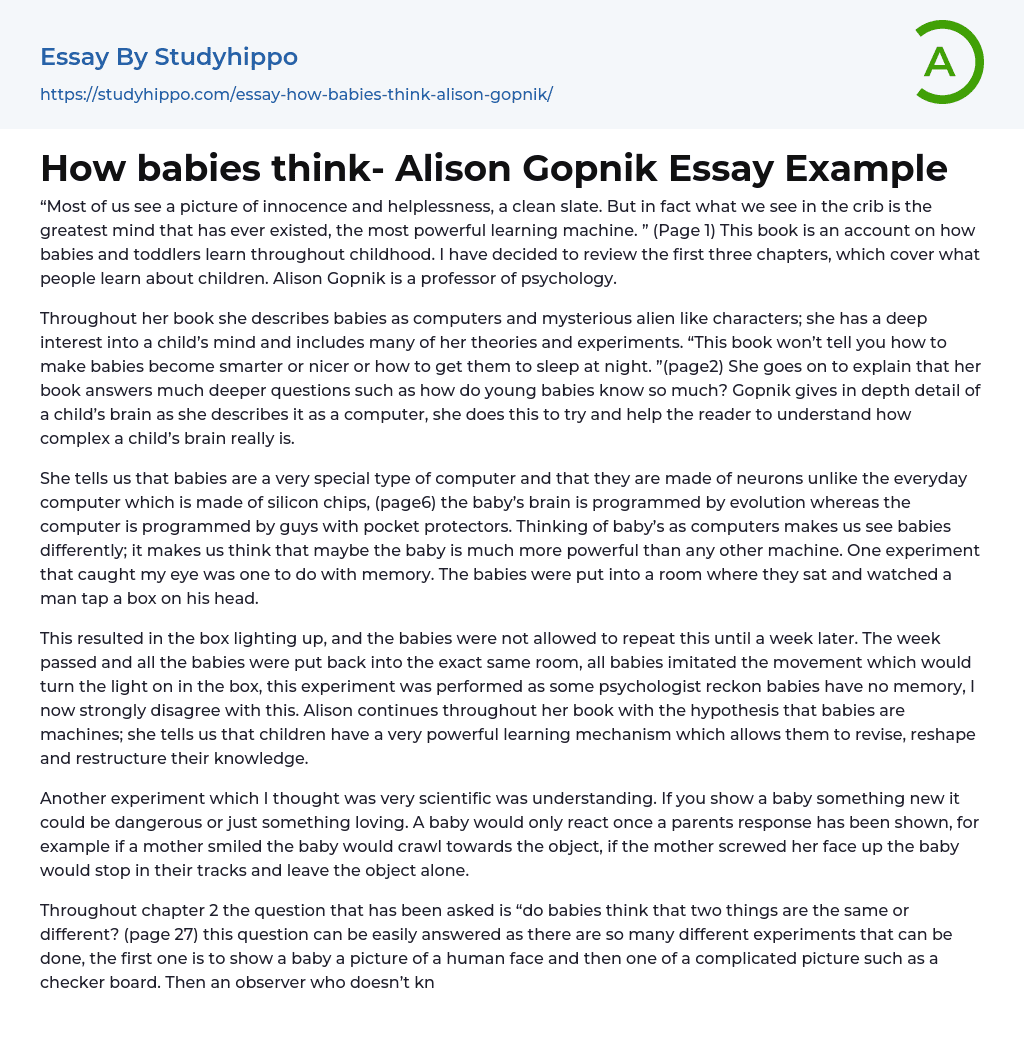“Most of us see a picture of innocence and helplessness, a clean slate. But in fact what we see in the crib is the greatest mind that has ever existed, the most powerful learning machine. ” (Page 1) This book is an account on how babies and toddlers learn throughout childhood. I have decided to review the first three chapters, which cover what people learn about children. Alison Gopnik is a professor of psychology.
Throughout her book she describes babies as computers and mysterious alien like characters; she has a deep interest into a child’s mind and includes many of her theories and experiments. “This book won’t tell you how to make babies become smarter or nicer or how to get them to sleep at night. ”(page2) She goes on to explain that her book answers
...much deeper questions such as how do young babies know so much? Gopnik gives in depth detail of a child’s brain as she describes it as a computer, she does this to try and help the reader to understand how complex a child’s brain really is.
She tells us that babies are a very special type of computer and that they are made of neurons unlike the everyday computer which is made of silicon chips, (page6) the baby’s brain is programmed by evolution whereas the computer is programmed by guys with pocket protectors. Thinking of baby’s as computers makes us see babies differently; it makes us think that maybe the baby is much more powerful than any other machine. One experiment that caught my eye was one to do with memory. The babies were put into a room where they sat
and watched a man tap a box on his head.
This resulted in the box lighting up, and the babies were not allowed to repeat this until a week later. The week passed and all the babies were put back into the exact same room, all babies imitated the movement which would turn the light on in the box, this experiment was performed as some psychologist reckon babies have no memory, I now strongly disagree with this. Alison continues throughout her book with the hypothesis that babies are machines; she tells us that children have a very powerful learning mechanism which allows them to revise, reshape and restructure their knowledge.
Another experiment which I thought was very scientific was understanding. If you show a baby something new it could be dangerous or just something loving. A baby would only react once a parents response has been shown, for example if a mother smiled the baby would crawl towards the object, if the mother screwed her face up the baby would stop in their tracks and leave the object alone.
Throughout chapter 2 the question that has been asked is “do babies think that two things are the same or different? (page 27) this question can be easily answered as there are so many different experiments that can be done, the first one is to show a baby a picture of a human face and then one of a complicated picture such as a checker board. Then an observer who doesn’t know what the babies are looking at records their eye movement. You would then analyse the eye movements and see what one the babies looked at longer. Another
method is to get babies sucking on a dummy’s that turn on different videos or audiotapes and determining which tape they will do some work for.
Before reading this book I would never have thought a baby could have been so intelligent. This book gives you an insight into a mother’s perspective and how a baby grows and develops. Gopnik writes with a nicely personal touch, often referring to her three children and five siblings uses a clear and very readable prose, squarely aimed at the general reader and sensibly divided into short sections, ideal for anyone burdened by babies or toddlers
- Baby Clothes essays
- Unconscious Mind essays
- Adoption essays
- Aunt essays
- Babies essays
- Bedroom essays
- Caring essays
- Children essays
- Daughter essays
- Divorce essays
- Dog essays
- Dysfunctional Family essays
- Family Tradition essays
- Family Values essays
- Father essays
- Foster Care essays
- Friends essays
- Grandparent essays
- Home essays
- Hometown essays
- Husband essays
- Jealousy essays
- Love essays
- Marriage essays
- Mother essays
- Online Dating essays
- Parenting essays
- Parenting Teens essays
- Parents essays
- Relationship essays
- Room essays
- Sibling essays
- Sister essays
- Wedding essays
- Wife essays
- Child essays
- Child labor essays
- Childcare essays
- Experiment essays
- Explorer essays
- Hypothesis essays
- Observation essays
- Qualitative Research essays
- Research Methods essays
- Theory essays
- Bias essays
- Big Five Personality Traits essays
- Body Image essays
- Mind essays
- Motivation essays




